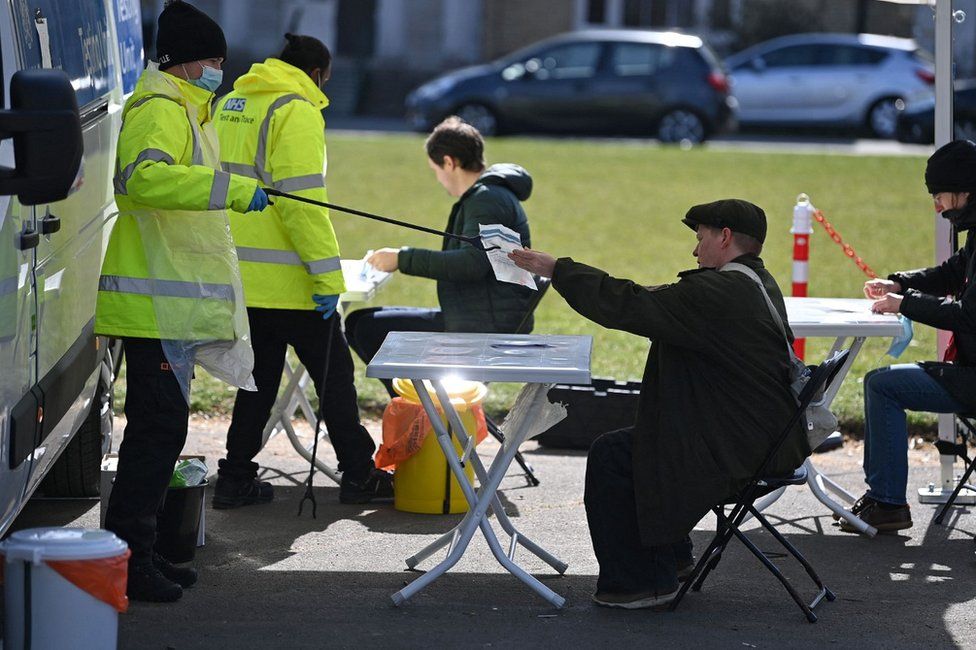Covid: South Africa variant surge probably due to person travelling from Africa
-
Published

The outbreak of the Covid-19 variant in south London appears to have been triggered by an individual who travelled from Africa in February, according to documents seen by the BBC.
Surge testing has begun in Wandsworth and Lambeth after 44 confirmed and 30 probable cases were identified.
The country involved was not on the red list for mandatory hotel quarantine at that time, but it is now.
The government said "strong measures" were in place to find new cases.
The prime minister's official spokesman added that the cluster of cases of the South African variant was being taken "very seriously" and the "testing processes that we have in place have been working well".
The link has not been proved beyond doubt, but is the working assumption of contact tracers.
An executive summary of the outbreak published on 12 April at 15:00 BST and marked "Official Sensitive" said the individual did self-isolate and requested a home test after showing symptoms.
It is thought the virus was spread from that individual to members of their household and then to a care home in Lambeth.
Twenty-three cases of the South African variant were detected in the care home - 13 staff and 10 residents.
Six of the 10 residents infected had received one dose of the AstraZeneca vaccine two or more weeks before their positive test date.
One of the 13 infected staff had a single Pfizer vaccine dose two or more weeks before their positive test.
The timing may raise questions about the vaccination of care home workers at a time when the government is considering making the jab mandatory for that group.
Other clusters related to the first outbreak were detected at two primary schools in Wandsworth.
More than half of the pupils, teachers and their families who could have taken up extra surge testing made available since the cases came to light have now done so.
An examination of wastewater in a small area of nearby Southwark also identified the presence of the South African variant, though that has not yet been linked to the outbreak in Lambeth and Wandsworth.
Targeted surge testing is expected to be put in place in Southwark as a result.
The documents, from the National Covid-19 Response Centre run by the Department of Health, describe the ongoing risk to public health of the outbreak in south London as moderate.
NHS officials previously described the number of cases identified as "significant".
People aged 11 and over who live, work or travel through the affected areas have been urged to take a Covid-19 polymerase chain reaction (PCR) test, as well as using twice-weekly rapid testing.
The Department of Health and Social Care said the two boroughs were carrying out the "largest surge-testing operation to date", with additional testing sites being opened.
According to government figures, a total of 544 confirmed and probable cases of the variant have been found in the country overall.
Those living in the affected areas should "still enjoy the easing of lockdown", according to the director of public health for Lambeth Council.
When asked on the Today programme whether people in the boroughs should stay at home rather than visit shops or pub gardens, Ruth Hutt replied: "No, we want everybody to follow the advice that still stands around 'hands, face, space'.
Shannon Katiyo, Wandsworth's director of public health, said it was "crucial that residents take an asymptomatic PCR test so that we can identify all cases".
"If you test positive by any method, you must isolate in order to prevent passing on the virus," she said.
Related Topics
-
-
Published12 April 2021
-
-
-
Published13 April 2021
-
-
-
Published10 March 2021
-
-
-
Published10 February 2021
-